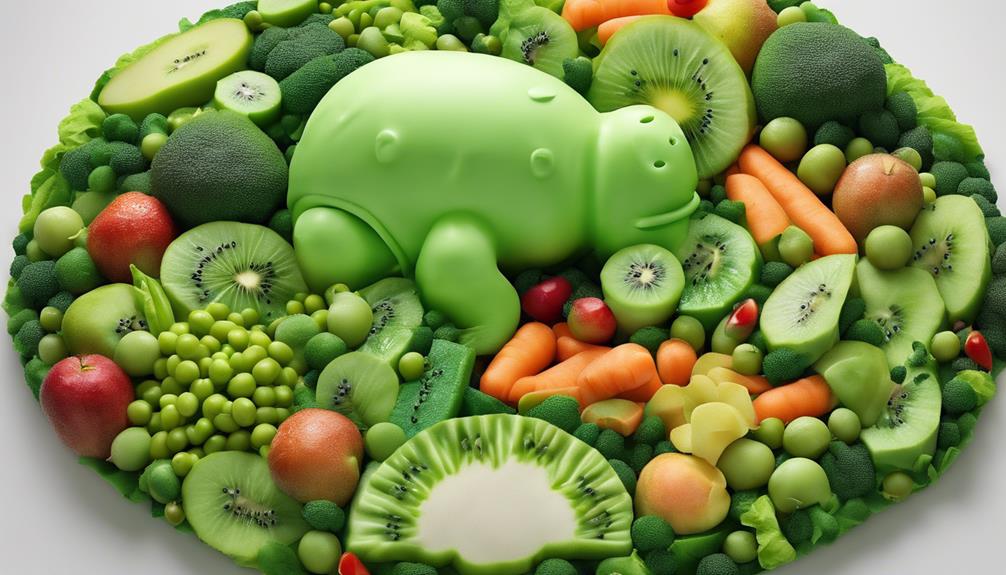Let's face it, dealing with newborn stinky poop can sometimes feel like deciphering a cryptic code or tackling a complex puzzle. The array of colors, textures, and odors can leave us scratching our heads and wondering what's challenging.
But fear not, understanding and managing your little one's bowel movements doesn't have to be a challenging task. By unraveling the mysteries behind those smelly diapers, we can gain valuable insights into our baby's health and well-being.
So, let's navigate the world of newborn poop together and demystify the art of diaper changing and digestion with practical tips and expert guidance.
Key Takeaways
- Newborn poop varies from black to yellow, indicating health and digestion progress.
- Abnormal colors like red, black, or white can signal health issues.
- Proper diaper change management prevents skin irritation and diaper rash.
- Recognize poop odor changes for potential absorption issues or allergies, seeking medical advice if needed.
What to Expect in Newborn Poop
When observing newborn poop, it's common to notice a progression from black meconium to green and then yellow seedy stools, especially in breast-fed babies. The color and consistency of newborn stool can provide valuable insights into their health.
In breast-fed infants, the stools are typically mustard-yellow and seedy in texture, indicating that they're receiving the appropriate nutrition. The shift from meconium to green and finally yellow stools signifies the clearing of the gastrointestinal tract as the baby starts to digest breast milk.
Understanding the color and consistency of newborn poop is pivotal for parents and caregivers to monitor the baby's well-being. Changes in stool color or texture can sometimes indicate underlying issues that may require attention. By being observant and knowledgeable about what's normal for a newborn, caregivers can promptly address any concerns that may arise. Remember, each baby is unique, and variations in stool patterns are common among newborns.
Interpreting Colors and Textures

Interpreting the colors and textures of newborn stool is important for evaluating their health status and identifying any potential issues early on. In newborns, stool color can vary from green to dark brown, which is typically considered normal. However, red, black, or white stools may indicate underlying health issues and require prompt medical attention. It's important to note that white stools in newborns are particularly concerning and should be evaluated immediately. Additionally, changes in stool consistency, such as moving from a mustard-like texture to hard or loose, can offer insights into the digestive health of the baby.
Meconium, the initial black, tarry stool passed by newborns, should be promptly expelled after birth. Its delayed passage could signal potential health problems that need to be addressed. Monitoring and recognizing abnormal stool colors and textures in newborns are essential for early detection and management of any underlying health issues related to their gastrointestinal system.
Managing Diaper Changes Effectively
To effectively manage diaper changes for newborns, it's essential to utilize fragrance-free wipes to minimize skin irritation risks. When changing your baby's diaper, follow these tips for a smooth and hygienic process:
- Gently clean the diaper area using fragrance-free wipes to avoid irritating your baby's delicate skin.
- Apply a thin layer of diaper cream to guarantee a protective barrier against moisture and potential irritants.
- Keep an eye out for any signs of diaper rash, such as redness, irritation, or bumps, during each diaper change.
- Guarantee proper disposal of soiled diapers in a sealed diaper pail to contain odors and maintain a fresh environment for your baby.
Tips for Cleaning Up Messy Diapers
We can guarantee proper hygiene and care for newborns by employing fragrance-free baby wipes when cleaning up messy diapers to prevent skin irritation.
Newborn babies have delicate skin that's prone to irritation, especially when exposed to stools frequently. When cleaning up messy diapers, it's important to use gentle wipes to avoid causing any discomfort or rashes. After using the wipes, gently pat the diaper area dry to guarantee that moisture is removed, which can help prevent diaper rash.
Additionally, applying a thin layer of diaper cream or ointment can create a protective barrier against further irritation.
Proper disposal of dirty diapers in a sealed diaper pail or trash can is essential for containing odors and maintaining cleanliness in the diaper changing area. Remember to wash your hands thoroughly with soap and water after each diaper change to guarantee the spread of germs and ensure proper hygiene for both you and your little one.
Handling Newborn Poop Odor
When handling newborn poop odor, it's important to understand that breastfed infants typically produce less pungent stool compared to formula-fed babies. The smell of a baby's poop can provide valuable insights into their health. Here are some key points to take into account:
- Breastfeeding vs. Formula Feeding: Breastfed newborns usually have less smelly stool due to the composition of breast milk.
- Gut Bacteria Development: As a baby's gut bacteria develop, the odor of their poop may become stronger over time.
- Absorption Issues: Foul-smelling stool in newborns could indicate absorption problems or potential food allergies.
- Pediatrician Consultation: If a baby's poop has an extremely strong or persistent odor, it's advisable to consult a pediatrician to rule out any underlying issues.
Understanding the nuances of your baby's poop odor can help in identifying potential absorption issues early on and ensure their overall well-being.
Frequently Asked Questions
Why Does My Newborn's Poop Smell so Bad?
Our newborn's poop may smell bad due to bacteria in the gut producing gases. Foul odors could signal digestive issues or food intolerance. Observing changes in smell early can help identify potential health concerns.
What Does Stinky Poopy Baby Mean?
Stinky poopy baby can signal digestive troubles, dietary issues, or health conditions. It's essential to address these concerns promptly. A pediatrician should be consulted for persistent foul-smelling poop. Identifying the cause helps in managing and ensuring the baby's health.
What Is Unhealthy Poop for Newborns?
Unhealthy poop for newborns can signal digestive issues. Abnormal colors like red, black, or white should be addressed promptly. Sour-smelling stools might indicate poor nutrient absorption. Any changes in color, consistency, or smell warrant discussion with a pediatrician.
Why Does My Baby's Poop Smell Like Halitosis?
We've noticed that sour-smelling stools in babies might resemble halitosis due to digestive system immaturity or bacterial imbalance. Adjusting diet, hygiene, and considering probiotics can rebalance the gut. Seeking medical advice for persistent issues is essential.
Conclusion
In summary, understanding and managing newborn stinky poop is pivotal for ensuring the health and well-being of your infant.
By closely monitoring bowel movements, interpreting colors and textures, and implementing effective diaper changing practices, you can promote healthy digestion and address any potential concerns early on.
Remember, seeking medical advice for any abnormal changes is essential for providing the best care for your baby.
Stay informed, stay proactive, and prioritize your baby's digestive health.










